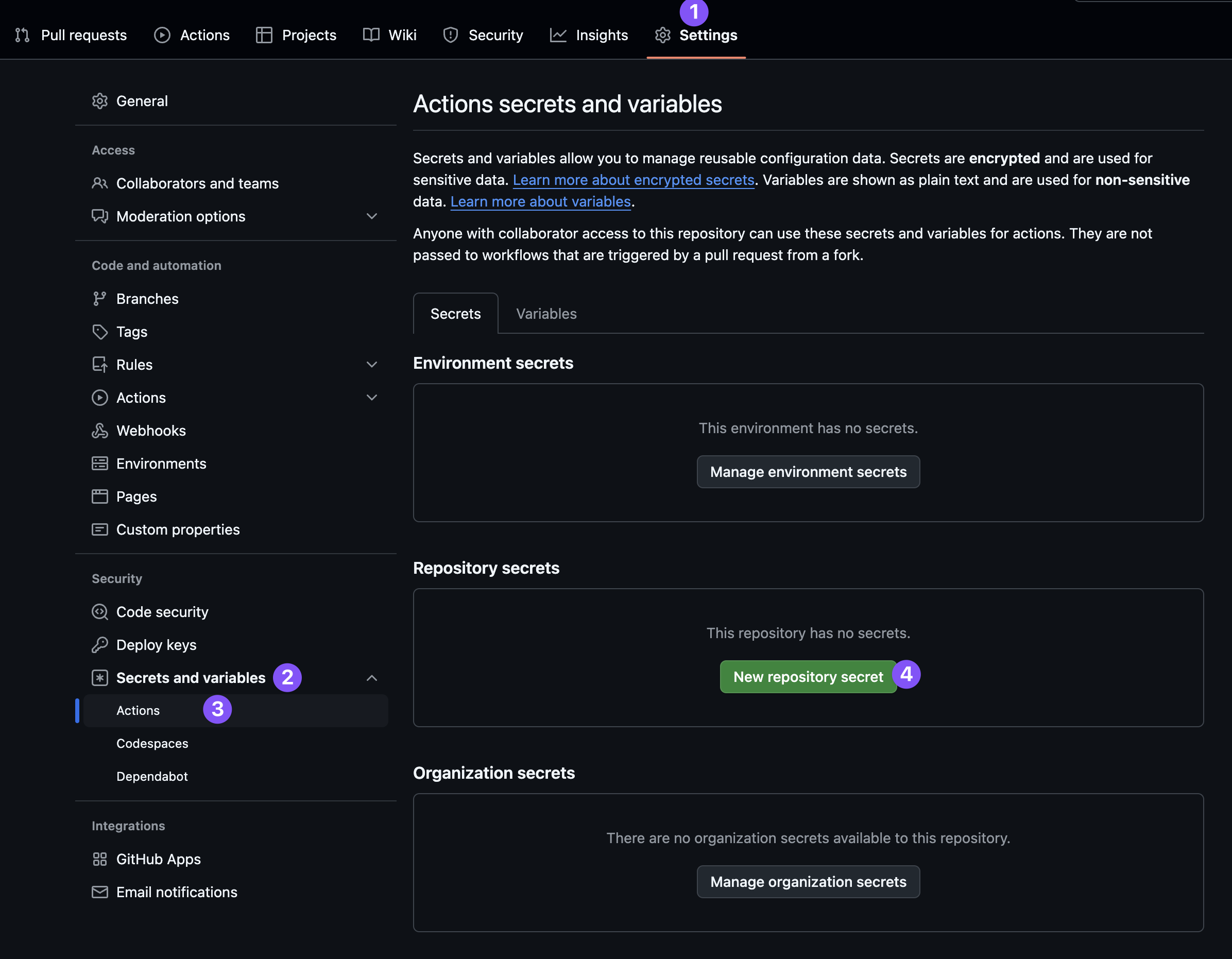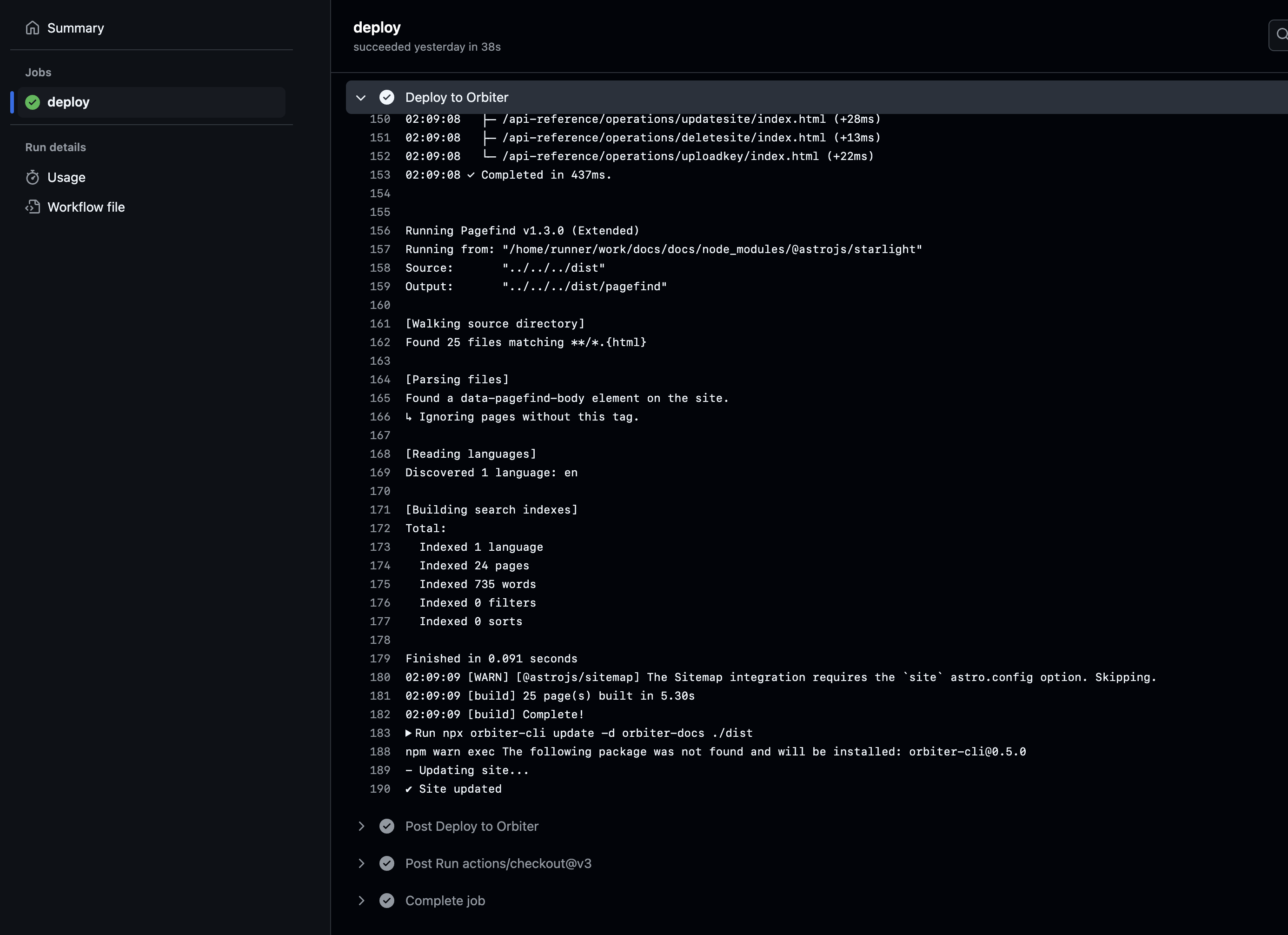GitHub Actions & Hooks
With Orbiter's API and CLI you can easily add GitHub integrations to enable automated deployments. Both GitHub Actions and Commit Hook flows do require to have a site already deployed and an API key ready to use.
GitHub Actions
Orbiter's GitHub Actions allow you to automatically deploy your site after each commit based on rules and other integrations you might be using
Deploy Your Site
Before you can use the Orbiter GitHub action you will need to deploy your site to Orbiter first! Follow the quickstart guide to get started!
Create and Store an API Key
Visit the API Keys page inside the Orbiter App and create a new key with Admin permissions.
Once you have a key, navigate to your GitHub project, then go to Settings > Secrets and Variables > Actions. Click New repository secret, then use ORBITER_API_KEY as the name, and then paste the secret into the box below.
Create the Workflow
In the root of your project make a new directory called .github in the root of your folder, then add a directory called worflows to it. Finally make a new file called deploy.yaml. Alternatively you can run this in the terminal:
mkdir -p .github/workflows && touch .github/workflows/deploy.yaml- .github
- workflows
- deploy.yamlInside the deploy.yaml file paste in the following configuration:
name: Deploy
on:
push:
branches: [main]
jobs:
deploy:
runs-on: ubuntu-latest
steps:
- uses: actions/checkout@v3
- name: Deploy to Orbiter
uses: orbiterhost/[email protected] # Update with latest version
with:
project-name: "mysite" # Name of your project
build-dir: "./dist" # Name of the build output directory
api-key: ${{ secrets.ORBITER_API_KEY }} # Will use repository secret
# Optional inputs with their defaults
node-version: "20.x" # Optional, defaults to '20.x'
build-command: "npm run build" # Optional, defaults to 'npm run build'Near the bottom you will see several fields that you will need to fill out for your particular project:
project-name: This would be the name you chose when you made the site. For example, the sitemysite.orbiter.websitethe name would bemysitebuild-dir: The name your build directory, e.g. dist, out, public, etcapi-key: This can be created on the API Keys Page of the Orbiter Appnode-version(Optional): Define the version of Node you want to use, will default to v20 which is the minumumbuild-command(Optional): Define the command used to build, default is npm run build
Once all of that information is set go ahead and save the file.
Git Push!
On your next commit to your main branch you should see under the actions tab that your site is building!
Alternative Flows
There are some cases where your site may not use a JavaScript framework or something that needs to build separately. In these cases you can build your own workflow that is similar to the one above, except you can manually setup your install and build steps. The only thing you really need for Orbiter is the update comand.
# ...Rest of the flow
- name: install dependencies
run: |
bundle install --path vendor/bundle
bundle exec jekyll build --config _config.yml,_config_development.yml --destination public
- name: Deploy to Orbiter
shell: bash
env:
ORBITER_API_KEY: ${{ secrets.ORBITER_API_KEY }}
SOURCE: github-action
run: npx orbiter-cli update -d my-site publicGit Commit Hooks
Another apporach to automating deployments is creating a post-commit hook that runs anytime you make a local commit. It uses the same API/CLI under the hood and will require having an existing project as well as an API key.
1. Deploy Your Site
Before you can use the Orbiter GitHub action you will need to deploy your site to Orbiter first! Follow the quickstart guide to get started!
2. Create and Store an API Key
Visit the API Keys page inside the Orbiter App and create a new key with Admin permissions. Once you have created it store the key in a .env file at the root of your project with the following:
ORBITER_API_KEY=<YOUR KEY>3. Create the Hook
If your project has already been initialized by Git you might see a .git folder in the root of the project. In there is a folder called hooks where we'll make a new file called post-commit
touch .git/hooks/post-commitOpen that file and paste in the following contents
#!/bin/bash
# Path: .git/hooks/post-commit
# Make sure to make this file executable: chmod +x .git/hooks/post-commit
echo "Running Orbiter deployment..."
# Run the CLI command here
npm run build && npx orbiter-cli update -d <your domain> <your build directory>
# Alternatively you can use the --siteId instead
# orbiter update -s <site-id> dist
# Check if the command was successful
if [ $? -eq 0 ]; then
echo "Orbiter update completed successfully"
exit 0
else
echo "Orbiter update failed"
exit 1
fiIn the highlighed line above you'll see some of the details you need to fill in for your particluar project. This would include the build command (e.g. npm run build), the domain of your site (if your site is mysite.orbiter.website then the domain to use here would be mysite), and your output build directory (e.g. out, dist, etc).
Once you have customized that file and saved it you will need to make the file an executable by running this command:
sudo chmod +x .git/hooks/post-commit4. Commit Away!
Now if you make a commit it should automatically build and deploy your site!
git add .
git commit -m "Testing Git hooks!"

